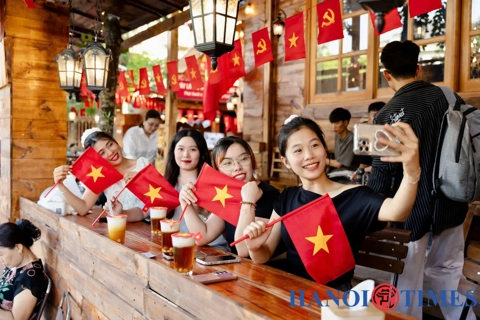Travel
Tour operators to involve more in tourism training
Jul 10, 2017 / 02:45 PM
Deputy Prime Ministy Vu Duc Dam had a meeting with representatives from tourism businesses and tourism training institutions on July 6at the Government Office.
At the meeting, the General Director of Vietnam National Administration of Tourism Nguyen Van Tuan said that the tourism industry is currently employing approximately 750,000 people. This number is expected to increase up to 870,000 by 2020. However, tourism human resources are not only in short of quantities but also weak with regard to a number of essentials skills including foreign languages, IT, communications, other soft skills and professional ethics.
At the same time, 156 tourism training estabishments nationwide have proven insufficient to meet the rising workforce demand. Furthermore, the distribution of training establishments is also fragmented. In addition, there is a lack of close linkage between state management agencies, training institutions and tourism enterprises.
From the experience of tourism business school of Saigon Tourist Corporation, Saigon Tourist General Director Tran Hung Viet said that only by gaining practical experiences at hotels and other accommodation facilities could tourism graduates meet the requirements of enterprises.
With regard to training institutions, the Head of Saigon Tourism College Ngo Thi Xuan Quynh said that practice accounts for a big proportion in the tourism teaching programs of the universities and community colleges and vocational schools. The teaching staff consists of large tour operators workers who conduct hands-on training. Approximately 65% of the instructors at Saigon vocational college come from tourism enterprises. However, according to the Law on Vocational Education, the instructors still have to earn a national vocational skills certificate, while there are no centers in Ho Chi Minh City to assess tourism skills.
Some leaders of vocational schools also suggested that there should be more relaxing mechanism in inter-related training and opening new subjects to attract learners.
From the feedback at the meeting, the Deputy Prime Minister Vu Duc Dam said that if the old way of tourism training cannot meet the requirements, then businesses need to support training facilities to change the current training of tourism human resources.
“Tourism training is similar to medical training as it involves a lot of practices. Therefore, the training center has to have a close relationship with tour operators like relationship between medical schools and hospitals. Bearing this in mind, the tourism sector and VITA need to study and propose solutions for experienced and highly qualified personnel from tourism operators to directly take part in the teaching process” the Deputy Prime Minister said.
Although thousands of bachelors and engineers are unemployed, fields such as tourism and IT still experience a growing problem of labour shortage. The Deputy Prime Minister requested the Ministry of Culture, Sports and Tourism (MCST) to reevaluate tourism training centers from vocational schoolto university level. It is also necessary to change education model and cooperate with large tour operators in developing learning courses matching the employer’s requirements.
Besides, MCST along with the Ministry of Education and the Ministry of Labour-Invalids and Social Affairs need to develop output requirements for tourism training from basic to higher graduation, as well as to research and select provinces with tourism advantages to establishtraining centers. One of the priority is also to work on training materials to develop community based tourism.
“Enterprises need to have a deeper involvement in tourism training. The government encourages and creates favorable conditions for tour operators, especially large cooperation in establishing their own non-profitable training centers. This is one of the top priority for the coming time”, the Deputy Prime Minister emphasized.
At the same time, 156 tourism training estabishments nationwide have proven insufficient to meet the rising workforce demand. Furthermore, the distribution of training establishments is also fragmented. In addition, there is a lack of close linkage between state management agencies, training institutions and tourism enterprises.

Deputy Prime Minister Vu Duc Dam emphasized the vital role of tourism enterprises in tourism training
|
With regard to training institutions, the Head of Saigon Tourism College Ngo Thi Xuan Quynh said that practice accounts for a big proportion in the tourism teaching programs of the universities and community colleges and vocational schools. The teaching staff consists of large tour operators workers who conduct hands-on training. Approximately 65% of the instructors at Saigon vocational college come from tourism enterprises. However, according to the Law on Vocational Education, the instructors still have to earn a national vocational skills certificate, while there are no centers in Ho Chi Minh City to assess tourism skills.
Some leaders of vocational schools also suggested that there should be more relaxing mechanism in inter-related training and opening new subjects to attract learners.
From the feedback at the meeting, the Deputy Prime Minister Vu Duc Dam said that if the old way of tourism training cannot meet the requirements, then businesses need to support training facilities to change the current training of tourism human resources.
“Tourism training is similar to medical training as it involves a lot of practices. Therefore, the training center has to have a close relationship with tour operators like relationship between medical schools and hospitals. Bearing this in mind, the tourism sector and VITA need to study and propose solutions for experienced and highly qualified personnel from tourism operators to directly take part in the teaching process” the Deputy Prime Minister said.
Although thousands of bachelors and engineers are unemployed, fields such as tourism and IT still experience a growing problem of labour shortage. The Deputy Prime Minister requested the Ministry of Culture, Sports and Tourism (MCST) to reevaluate tourism training centers from vocational schoolto university level. It is also necessary to change education model and cooperate with large tour operators in developing learning courses matching the employer’s requirements.
Besides, MCST along with the Ministry of Education and the Ministry of Labour-Invalids and Social Affairs need to develop output requirements for tourism training from basic to higher graduation, as well as to research and select provinces with tourism advantages to establishtraining centers. One of the priority is also to work on training materials to develop community based tourism.
“Enterprises need to have a deeper involvement in tourism training. The government encourages and creates favorable conditions for tour operators, especially large cooperation in establishing their own non-profitable training centers. This is one of the top priority for the coming time”, the Deputy Prime Minister emphasized.








